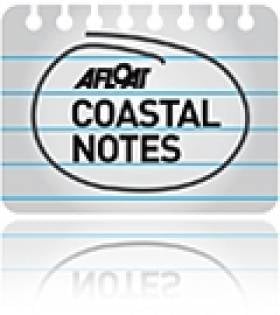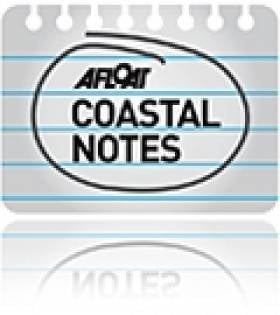Displaying items by tag: SPA
Stakeholder Consultation on Restricted Activities Under Proposed SPA for Seabirds in North-West Irish Sea
The Minister for Housing, Local Government and Heritage has issued a direction regarding activities requiring prior ministerial approval within the site of the proposed special protection area (SPA) for seabirds in the North-West Irish Sea.
As reported earlier this year on Afloat.ie, the proposed new SPA will cover over 230,000 hectares extending out from Dublin Bay to as far north as Dunany Point in Co Louth, and will increase Ireland’s percentage of marine waters protected under the EU Birds and Habitats directive to over nine per cent.
The list of Activities Requiring Consent relating to the SPA includes the following:
- Reclamation, including infilling.
- Blasting, drilling, dredging or otherwise removing or disturbing fossils, rock, minerals, mud, sand, gravel or other sediment.
- Introduction, or re-introduction, of plants or animals not found in the area. (Consent is not required for the planting of crops on established reseeded grassland or cultivated land.)
- Undertaking scientific research involving the collection and removal of biological material.
- Any activity intended to disturb birds, including by mechanical, air, gas, wind-powered or audible means.
- Developing or consenting to the development or operation of commercial recreational/visitor facilities or organised recreational activities.
- Undertaking active acoustic surveys in the marine environment.
Observations in relation to the classification of the site may be submitted by interested parties and must be supported by scientifically based ornithological criteria.
Any objections to the classification of the site as a SPA or the Ministerial Direction may be lodged with the National Parks and Wildlife service.
The closing date for receipt of any observations or objections is 19 February 2024 and further details are included in Marine Notice No 80 of 2023, attache below.
Dalkey Meeting to Discuss Proposed Oil Drilling
#'DALKEY ISLAND' PROSPECT – In response to a proposed exploratory search for oil and gas operation by Providence Resources off Dalkey Island, Co. Dublin, as previously reported on Afloat.ie, a public meeting is to be held by Dalkey Community Council next week, writes Jehan Ashmore.
The meeting to be held next Tuesday in Dalkey Town Hall (at 7.30 p.m.) is to discuss the Providence venture, named 'Dalkey Island' prospect, in reference to the island off the south-side suburb. The island and the coast along Dalkey is geographically the nearest landfall to where the proposed 'jack-up' drill rig would operate in block (33/21) in the Kish Bank Basin.
An online petition (see www.protectourcoast.net) by campaigners, entitled 'Protect Dublin Bay, Dalkey Island and Killiney Bay from Large Oil Drill 2012', has already gained large support, including signatures from overseas. They are in protest over Providence Resources application for a foreshore license which has been lodged with the Department of Environment.
Providence Resources propose to drill a single borehole for the exploratory well which is likely to be in an area only 6kms offshore of the Dalkey coastline. The island is designated a Special Protection Area (SPA) and notably where there have been sightings of bottlenose dolphins in neighbouring Killiney Bay.
Should the oil be commercially viable, the benefits of becoming self-sufficient and security of supply would be of significant economic benefit to Ireland. To date 100% of the country's oil and 95% of its gas is currently imported, and yet most of Ireland's natural resources are unexplored, according to Providence Resources.
Exploration is an expensive exercise and has no guarantee of discovery while the timeframe from discovery to production can typically take five to seven years.
"Yet," say Providence Resources, "the implications of discovering and utilising such a natural resource, and potentially becoming self-sufficient in energy terms, would be of significant economic benefit for Ireland Inc. in terms of taxation, employment, security of supply and skills development."
To read more information about Dalkey Island Prospect from Providence Resources, with maps, montages (including views from White Rock Beach) newsletters and video presentation visit www.providenceresources.com/dalkeyisland.aspx
- Dublin Bay
- bottlenose dolphins
- dalkey
- Dalkey Island
- Providence Resources
- Kish Bank Basin
- Coastal Notes
- Killiney Bay
- Special Protection Area
- Dalkey Community Council
- Foreshore License
- SPA
- 'Dalkey Island' prospect
- Coastal note news
- Department of Environment
- ProtectOurCoast
- Protect Dublin Bay,Dalkey Island and Killiney Bay from Large Oil Dril 2012
Campaign to Stop Planned Oil Drill off Dalkey Island
#DALKEY ISLAND PROSPECT - An online petition organised by Protect Our Coast in protest over plans by Providence Resources to start exploratory drilling for oil and gas off Dalkey Island, in south Co. Dublin, has reached over 2,000 signatures to date, including support from overseas.
Providence Resources are seeking permission from the Department of Environment for a foreshore licence to carry out site investigation and drill testing in waters depths of 20-30m in the Kish Bank Basin, at the Dalkey Island 'Prospect'.
They propose drilling one exploratory well some 6kms offshore, though the exact location chosen for the well site is subject to results of seismic surveys. This particularly area lies closer to the coastline, as it is on the more westerly fringes of the exploratory block (33-21) zone.
The campaigners object to the proximity of the well site off Dalkey Island which is designated a Special Protection Area (SPA). The island is home to a resident herd of goats, is rich in birdlife, seals and cetaceans, notably bottlenose dolphins in neighbouring Killiney Bay, which have drawn recent media attention and aided the objectives of the campaign, see www.protectourcoast.net
In addition they oppose the drilling location given its closeness to a large urban population and the risk of an oil-spill and consequent effects to humans and the environment throughout Dublin Bay.
If granted, exploratory work is due to start this year, with Providence claiming the entire process would take up to six months, between survey and drilling operations. During part of that timeframe, up to two seismic vessels will be employed, prior to deploying a 'jack-up' rig to the well site.
Should the oil be commercially viable, the benefits of becoming self-sufficient and security of supply would be of significant economic benefit to Ireland. To date 100% of the country's oil and 95% of its gas is currently imported, and yet most of Ireland's natural resources are unexplored, according to Providence Resources.
Exploration is an expensive exercise and has no guarantee of discovery while the timeframe from discovery to production can typically take five to seven years.
"Yet," say Providence Resources, "the implications of discovering and utilising such a natural resource, and potentially becoming self-sufficient in energy terms, would be of significant economic benefit for Ireland Inc. in terms of taxation, employment, security of supply and skills development."
To read more information about Dalkey Island Prospect from Providence Resources, with maps, montages (including views from White Rock Beach) newsletters and video presentation visit www.providenceresources.com/dalkeyisland.aspx
As previously reported on Afloat.ie, the application for the foreshore license is currently on view in Dalkey and Dun Laoghaire Garda stations. The application contains maps, plans, and drawings which can be inspected, noting the public consultation process ends on Thursday 2nd February 2012.
In addition for information from the Department of Environment's website, click HERE. Those wishing to make an objection or representation of the sought license should make submissions to the Foreshore Unit of the department on close of business (also) on Thursday 2nd February 2012.
.
- Dalkey Island Prospect
- Dublin Bay News
- Providence Resources
- Protect Our Coast
- Dublin Bay Oil drilling
- Killiney Bay
- Dalkey Island
- Dalkey Island Goats
- Dalkey Dolphins
- Department of the Environment
- Foreshore License
- White Rock Beach
- Killiney Beach
- Kish Bank Basin
- Special Protection Area
- SPA
- JackUp rig
- seismic survey
- Irish economy
- Online petition
- Well Site
- Exploratory Well Kish Bank Basin
- Cetaceans
- bottlenose dolphins






























































